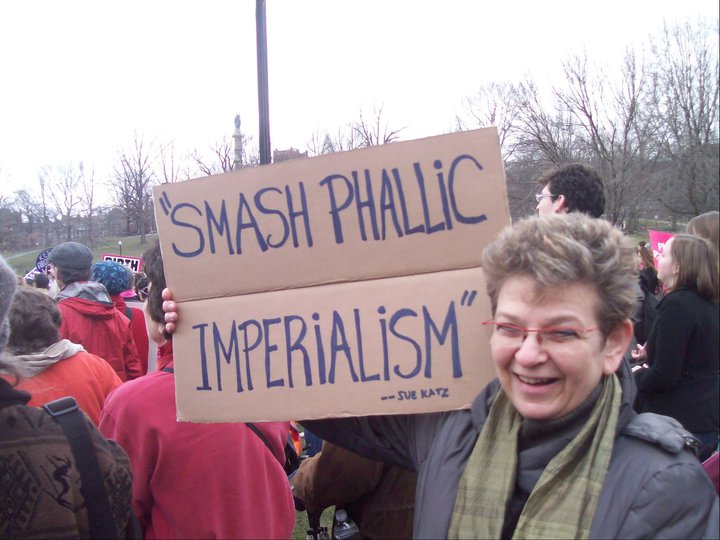By Sue Katz
Hi Queers under 40,
I was a baby butch in the days when being caught with my high school girlfriend led to threats of incarceration and electroshock. In fact, she nearly succeeded in killing herself and I was forced to undergo therapy with a pig who wanted to know, over and over, what I did to her and what she did to me. She and I were separated, forbidden to meet. It was 1964.
I was a baby butch when the law required that you wear at least three pieces of clothing suitable to your own sex, so our motorcycle jackets and ties and cuff links were all threats to our very freedom.
I was a baby butch decades before there was an internet, when we often met our lovers by flirting with the other women standing in the line to the bathroom at the bar.
I knew women who passed by binding their breasts and lowering their voices, because they needed the higher-paying jobs from which women were excluded in order to support themselves and perhaps their girlfriends. There were lots of children involved in those days too, for many gay people straight-married and built nuclear families before they found out why they felt the way they felt. Or found someone else to feel it with.
I was a lesbian in the days when my mother felt free to tell me that I had caused my father’s heart disease because of the stress of having a perverted daughter. I remember too well how upset my sisters in my first women’s liberation collective were to find out that there were a couple of lesbians among us. I was fired for being a dyke (well, um, for bringing my girlfriend to the office to play boss/ secretary while my actual boss was away).
I’ll never forget the exhilaration of the first time, when sleeping with a woman, that I could name it, say it aloud, be it – lesbian, dyke, queer, butch, gay. I can almost feel today how it felt back then when the word “lesbian” journeyed from my heart to my lips to the world. I remember my first article, “Smash Phallic Imperialism,” in our first gay liberation newspaper Lavender Vision. And I will never forget our working class lesbian posse, Stick-It-In-TheWall-Motherfucker Collective.
So forgive me if I have been puzzled by more recent USA LGBTQ politics. Gay politics has gone from revolutionary to assimilationist. We seem to have forgone our Lavender Vision in exchange for a place in the institutions that do such harm. First there was an excess of energy invested in glorifying the American military as the rightful and right place of employment for LGBTQ people. This is the military whose wars (from Viet Nam to Iraq) we spent so many years opposing. Of course Don’t Ask, Don’t Tell was a disgusting piece of discrimination, but our “leaders” could have picked any number of vile discriminatory situations. I remember one group of people who felt the same way and who marched in Pride with fabulous hats and signs saying “Gays to the Millinery.”
I feel like a curmudgeon, for I find it hard to unconditionally celebrate what pass for victories today. I simply cannot stomach, for example, the degree of resources invested in the battle for marriage equality. Two basic foundations of early feminist theory were that marriage was founded on the need to protect male property and to document paternity, and that the nuclear family was a dangerous place for women and children. In women’s liberation we envisioned an end to civil marriage (obviously people are free to do what they want within their religions) and an end to a ramge of privileges accruing to people (then just straight people) just because they have a partner. Are single people mere chopped liver?
Instead of being able to share your health insurance with only that person deemed by the government to be significant (ie, your spouse), we should be fighting for Medicare-for-all, like they have in almost every other developed and some developing nations. Marriage is predicated on the anti-social ideas that “It’s you and me against the world, baby,” and “One doesn’t wash dirty family laundry in public.” So when terrible things are happening, the family is more important than truth or safety. Plus, capitalism loves the nuclear family, because then they can sell each one an individual fridge and washing machine and car. Communes and collectives and co-ops might actually share.
The idea that queers are shoring up an institution that has failed so utterly for heterosexuals is disheartening, to use a polite word. Half of all marriages end in legal divorce: can you imagine how many just chug along in misery or separation?
When we were sexual outlaws, we saw “equality” as an undesirable and unambitious goal. We wanted liberation through changing the world, not engagement rings. Instead, we have achieved well-paid “leaders,” mostly middle-class white men, who are jockeying for future jobs with the Democrats and the policy wonks. Meanwhile, our communities are facing major economic issues. Our young people make up a disproportionate number of the homeless youth living on the streets in impossible conditions – mainly because of dangerous or rejecting family homes. Where are the voices of the LGBTQ leaders? Wealth disparity is hitting queers of color and women where it hurts. We need to fight against discrimination in jobs, housing, and schooling, instead of giving such prominent visibility to ensuring that rich queers can inherit from their partners without paying stranger taxes.
Of course people should have the right to equally participate in all public institutions no matter whom they love. Equality of opportunity is fundamental to our society as it is. But let’s go further.
The generations after us pioneers have had the luxury of reading the books and seeing the films we produced, of calling the helplines we established, and of living LGBTQ lives without being categorized as mentally ill. Now we, the aging founders, are engaged in getting the institutions that service seniors to recognize our own particular needs. While we are busy with that, I trust that younger queers will be preparing to fight like hell to change the world in ways I cannot even imagine at this point. I trust that they will conceive and execute their very own Lavender Vision.
In curmudgeonly solidarity,
Sue Katz
Sue Katz is a wordsmith and rebel, whose unique book about the love-lives of older people, Lillian’s Last Affair: and other stories, has just been published. She has been a writer and activist on the three continents where she has lived. Check out her edgy blog Consenting Adult at www.suekatz.typepad.com and reach her at consentingadultpress@hotmail.com.


